Abstract
The aim of the present study is to investigate the school principals’ opinion regarding the most effective strategies to be pursued in order to reach the goal of consolidating the school-family partnership. Based on the collected information, the study offers a set of suggestions to apply so as to strengthen the cooperation between parents and teachers. The online questionnaire designed by us was filled in by school principals from different counties of Romania, during the school year 2017-2018. It is generally accepted that a high-quality involvement of the family in children’s education and in school life has positive effects on children's development. According to the participants, a high level of family involvement in school life could have sometimes negative effects on school-family partnerships, if parents have unrealistic expectations about the school results of the children. Considering the increasing interest of education theorists and practitioners in the issue of partnerships, we believe that this survey could offer the teachers who wish to build a genuine partnership between the school and the families of primary school-age students effective courses of action. All the school-managers who have participated in our research believed that for maintaining an effective cooperation between school and family a high level of trust and decisional transparency is necessary.
Keywords: School-family partnershipRomanian primary educational systemfamily involvementeducational workshops for parents and children
Introduction
School principals and teachers understand the importance of a good cooperation between educational institutions and the student’s families. Most of the schools have created action plans to consolidate the partnership with the family and the community. In 1986, Friedman Y. has described the following approaches regarding the school-family partnership: the open door pattern, the closed door pattern, and the balanced pattern (Blandford & Knowles, 2009; Blandford, 2006). The relationship between the school employers and the families described by each of these approaches is influenced by the level of trust of the school leaders in the ability of the families to support their effort to provide the best educational opportunities for the students. The open door pattern is based on a close relationship between the school and the family, mutual trust, positive attitude and managerial policies that encourage a high level of participation of the families in the process of decision making. The balanced pattern is characterized by a moderate level of trust and decisional transparency. The closed door pattern is based on managerial policies that do not encourage families to participate actively in school life and in the process of decision making.
School principals should have an effective cooperation with other persons or institutions directly or indirectly involved in the educational process. Romania’s Law of National Education (law no. 1/2011) includes in Article 3 an inventory of the principles that guide Romania’s educational system. Some of the most important of them are: the principle of transparency, the principle of decentralization, the principle of the responsibility and the participation of the parents, and the principle of dialogue and consultation during the process of decision making.
School-family partnership could be defined as a “strong cooperation between school and family, which supports the education and development process of children, according to society’s demands”. (Marin, Bocoș, & Călin, 2017, p. 102). The most used strategies to consolidate school-family partnerships are collective and individual meetings and consultations, writing weekly or monthly reports, using correspondence notebooks, doing home visits, volunteering, participating in school and extracurricular activities (Răduț-Taciu, Bocoș, & Chiș, 2015; Pancu & Bocoș, 2016). According to the teachers’ opinions, the most frequently used strategies are individual meetings, extracurricular activities and collective meetings (Marin, Bocoș, & Călin, 2017).
Problem Statement
Previous surveys we conducted have investigated the opinions of the parents and the view of the primary school teachers regarding the effective methods of a high-quality cooperation between the school and the families (Marin & Bocoș, 2016; Marin, Bocoș, & Călin, 2017). Considering that managerial politics and decisions may influence the strategies adopted by teachers in order to consolidate school-family partnership, we have designed a questionnaire that may help us understand their opinions on the educational realities regarding the process of building effective partnerships with the families.
Research Questions
The main research questions established by us were:
1. What are, from the school principals' perspective, the best strategies to consolidate the school-family partnership at the beginning of the Romanian primary educational system?
2. Which are the main obstacles that could intervene in establishing good relationships between school and families?
Purpose of the Study
We have conducted this study with the purpose of analyzing some school principal’s opinion in regard to the most appreciated and frequently used strategies in building effective school-family partnerships. The previous studies conducted by us were with establishing effective methods of consolidating school-family partnership taking into consideration the parents and the teachers’ opinion.
Research Methods
The method used in the research to collect data is the questionnaire survey. The survey conducted was realized in the online environment during the school year 2017-2018. The questionnaire was filled in by 64 school principals. Participants answered to 9 opened or semi-opened questions.
The answers to question 1, “To which area category does the educational institution you manage belong?”, showed that most of the respondents are occupying a leading position into schools situated in the rural areas of Romania (see figure
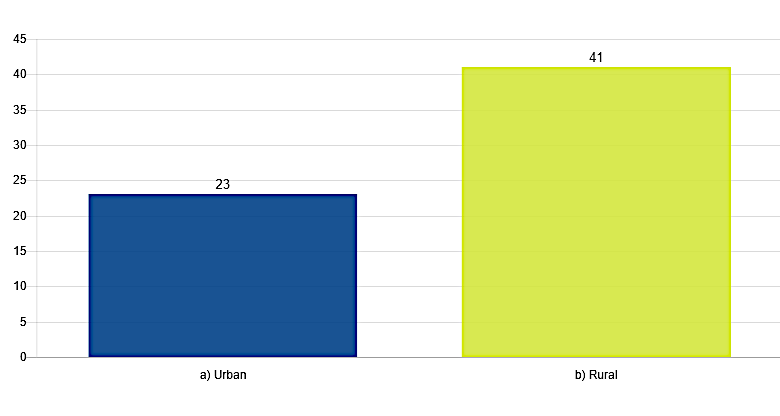
The answers to question 2 “In which county is the educational institution that you manage located?” indicate that the questionnaire designed by us was filled in by school principals from different counties from Romania, such as Iași, Buzău, Timiș, Suceava, Harghita, Caraș-Severin, Brașov, Cluj, Alba, Vrancea, Sibiu, Bihor, Botoșani, Vaslui, Dolj, Bacău, Bistrița-Năsăud, Olt, Neamț, Brăila, Gorj, Argeș, Mehedinți and Galați County.
The answers to question 3, “What barriers arise most often during early primary education in building a genuine partnership between school and family?”, showed that one of the most frequent factors that influenced the school-family partnership in a negative way is the low educational level of some of the parents, the low interest displayed by some of the parents, and the busy schedule of some of the parents. Other obstacles identified by the teachers are the different visions about the instructional processes, a low level of confidence between parents and teachers, the poor living conditions or the low income of some of the families, migration of the parents to other countries for a better-paid job. In absence of the parents, usually, the responsibilities regarding the education of children are taken over by grandparents (see figure
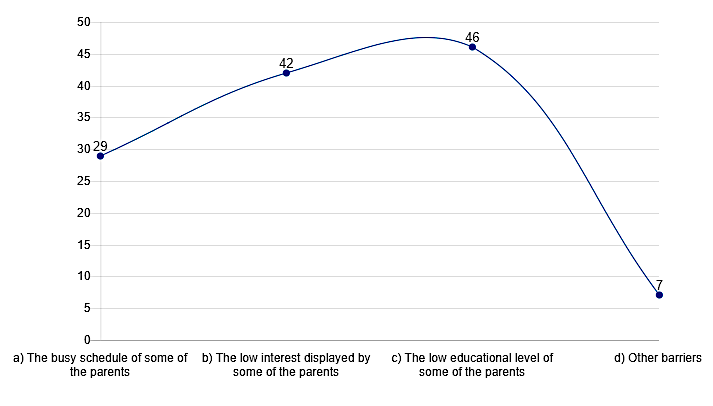
The answers to question 4, “Which of the following strategies for strengthening the school-family partnership do you think should be applied frequently, in order to maintain a close and effective cooperation with the parents?” showed that most of the school principals considered that organizing educational workshops for parents and students, individual meetings and extracurricular activities where parents are also invited are effective strategies that should be used in order to strengthen school-family partnership (see figure
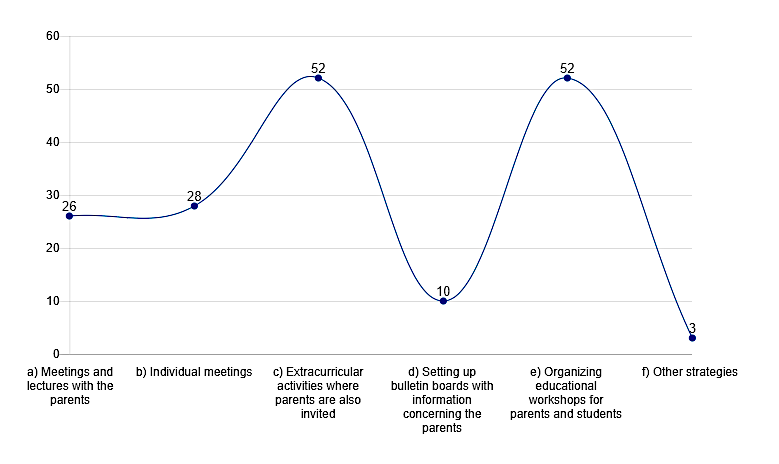
Almost all the participants answered affirmatively to question number 5, “Do you think that organizing regular educational workshops for parents and students, consisting of common parents-children activities that are meant to stimulate the students’ multiple intelligences could have positive effects on the school-family cooperation?” A very small percentage of the respondents have selected the variant options “I don’t know” (see figure
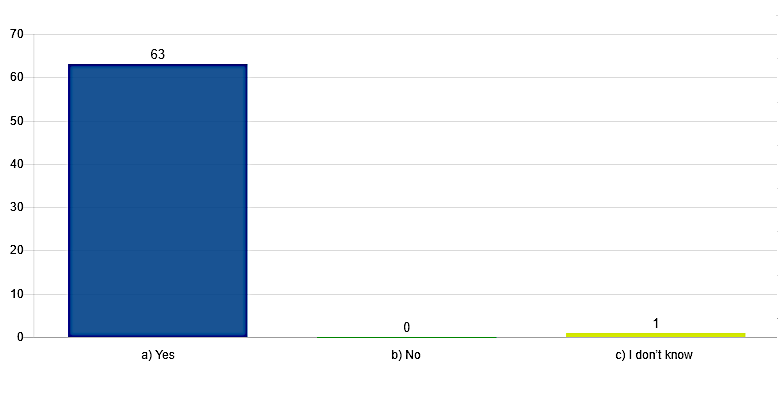
The affirmative answers to question 6, “Do you think that participating in training modules / courses can help primary school teachers manage the school-family relationships more effectively?”, indicate that most of the respondents have considered that participation in training modules/ courses can help primary school teachers to manage more effectively the school-family relationships. Just a small percentage of respondents have selected the response variant “I don’t know”.
The answers offered to the question 7 “Do you think that it would be useful to pay more attention to the recent research results regarding the means of strengthening the school-family partnership during meetings of the methodology committees for primary school teachers and during pedagogical activities?” indicate that the majority of the school principals involved in our survey believed that it would be useful to pay more attention to the recent research result, which should be discussed more frequently during the contexts that offer teachers the privilege to share their ideas and examples of good practices regarding the matter of school-family partnership.
The answers selected for question number 8, “For maintaining an effective cooperation between school and family, which of the following three approaches to the cooperation relationship between school and family do you think is the most suitable?” indicate that none of the respondents considered that the closed door approach, characterized by low decisional transparency, is beneficial. According to their answers, a high or moderate level of decisional transparency is necessary. We can conclude that their managerial decisions are founded on the open door or the balanced pattern described by Y. Friedman (see figure
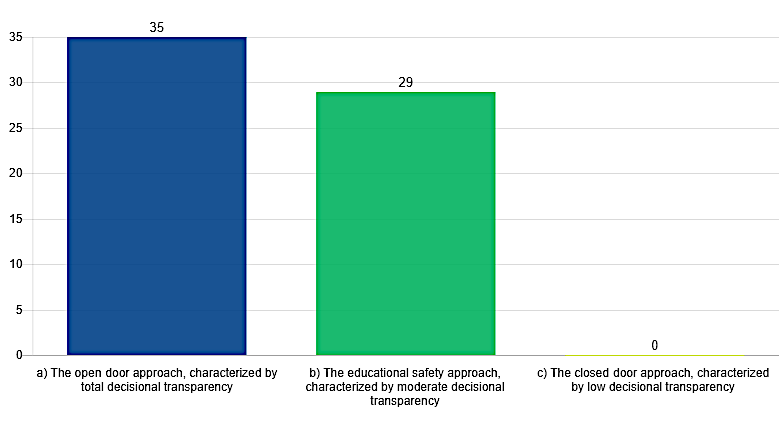
The content of the question number 9 was: “Do you think that a high level of family involvement in school life can always be associated with a high-quality cooperation between school and family?” The answers of the participants in regard to the direct relationship between the quality of the school-family cooperation and the level of involvement in school life indicate that most of them have considered that a high level of involvement should be associated with a high-quality cooperation between school and family. However, a small part of them indicate that sometimes o high level of involvement of the families in school live can influence negatively the quality of school-family partnership.
Findings
We have discovered that the majority of participants consider that the most effective strategies to consolidate the school-family partnership during the beginning of the Romanian primary educational system are the following:
•organizing educational workshops for both parents and students;
•individual meetings;
•extracurricular activities to which parents are also invited.
Most of the participants have stated that organizing regular educational workshops for parents and students, consisting of common parent-child activities that are meant to stimulate the students’ multiple intelligences could have positive effects on the school-family cooperation. Simultaneously, we have discovered that according to the school principals’ view, the most significant factors which influence the quality of school-family partnership are, as follows:
•the low educational level of some of the parents;
•the low interest displayed by some of the parents:
•the busy schedule of some of the parents.
Other barriers mentioned by respondents are the migration of the parents to other countries for a better-paid workplace, the low income and poor living conditions of some of the families, and different views of the parents and teachers regarding the educational process.
The previous study revealed that according to the teachers’ opinion, the most effective and frequently used strategies of consolidating the school-family partnership are individual meetings, extracurricular activities, and collective meetings (Marin, Bocoș, & Călin, 2017). The opinions of the teachers and of the school principals regarding the most effective strategies to improve school-family cooperation are very similar.
Conclusion
It is important to outline that research concerning effective methods of strengthening school-family partnership should be continued by developing programs of increasing parent’s involvement in children’s education and in school life. All the programs should be based on the parents, teachers and school principal’s view in regard to the strategies that should be implemented for a strong cooperation between families and school institutions. Researches with a larger number of participants, from all important geographical areas of Romania, are necessary to be realised in order to understand the factors that influence the quality of school-family partnership.
Acknowledgments
We would like to thank all the participants for their support in conducting this study.
References
- Blandford, S. & Knowles, C. (2009). Developing professional practice, 0-7. Harlow, England: Pearson Longman.
- Blandford, S. (2006). Remodeling School Manual: Workforce Reform. Harlow, England: Pearson Longman.
- Marin, D.-C., & Bocoș, M. (2016). Characteristics of the Communication between Parents and Students of the Preparatory Class. Barriers, Positive Factors, and Responsibilities of Teachers, Educatia 21 Journal, 14, 1-4.
- Marin, D.-C., Bocoș, M., & Călin, C. V. (2017). Effective Methods of Strengthening the School-Family Partnership during the Preparatory Grade. The European Proceedings of Social & Behavioural Sciences EpSBS, XLI, 101-107
- Răduț-Taciu, R., Bocoș, M.-D., & Chiș, O. (coord.). (2015). Tratat de management educational pentru învățământul primar și preșcolar. [Educational management treaty for the primary and pre-school education]. Piteşti: Editura Paralela 45.
- Pancu, D.-C, & Bocoș, M. (2016). Strategies for Improving School – Family Cooperation in the Romanian Primary Educational System. The European Proceedings of Social & Behavioural Sciences EpSBS, XVIII, 481–486.
- Romania’s Law of National Education (2011). Retrieved from https://www.edu.ro/sites/default/files/_fi%C8%99iere/Minister/2017/legislatie%20MEN/Legea%20nr.%201_2011_actualizata2018.pdf
Copyright information

This work is licensed under a Creative Commons Attribution-NonCommercial-NoDerivatives 4.0 International License.
About this article
Publication Date
25 June 2019
Article Doi
eBook ISBN
978-1-80296-062-4
Publisher
Future Academy
Volume
63
Print ISBN (optional)
-
Edition Number
1st Edition
Pages
1-613
Subjects
Teacher, teacher training, teaching skills, teaching techniques, special education, children with special needs
Cite this article as:
Marin, D., & Bocos, M. (2019). School Principals’ Opinion On The Strategies Of Strengthening School-Family Partnership. In V. Chis, & I. Albulescu (Eds.), Education, Reflection, Development – ERD 2018, vol 63. European Proceedings of Social and Behavioural Sciences (pp. 554-550). Future Academy. https://doi.org/10.15405/epsbs.2019.06.64

